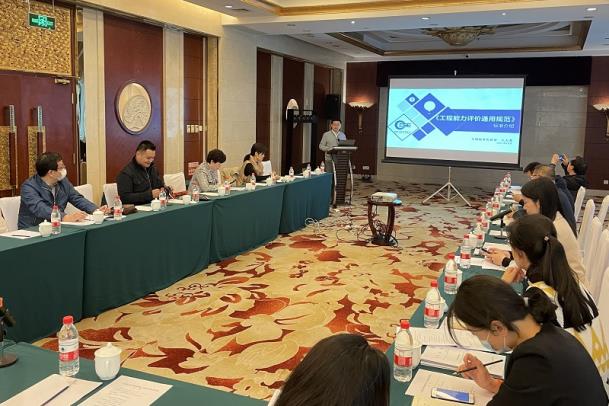In order to strengthen the construction of China’s engineering competency assessment system that is substantially equivalent to relevant global standards, the CAST Center for Professional Training and Services (hereinafter referred to as the “Center”) officially initiated the revision of the General Specification of Competency Assessment for Engineers (hereinafter referred to as the “General Specification”) in July 2020. Since then, the expert group has thoroughly studied the professional title system of domestic engineering and technical personnel and relevant international (national and regional) engineer certification standards, and has solicited opinions from relevant institutions for several times. So far, the Center has completed its first revision of the General Specification, which was issued on October 9 and officially implemented on October 25, 2021.

The Center organized a group standards publicity and implementation campaign of the General Specification on October 11 in order to fully interpret the content of the newly revised document, improve the engineering competency assessment of relevant national societies, and exchange their practical experience in international mutual recognition of engineering qualifications. The event was presided over by Wang Tianyi, Director of the Technical Development Department of the China Association for Standardization, and attended by specific heads of relevant national societies and the candidate-assessors of engineering competency assessment by online and offline means.
Certain engineering and technology fields are added to the newly revised document to meet the actual work needs. It is made clear that engineering members are ranked as the three levels of Apprentice Engineer (AE), Professional Engineer (PE), and Senior Professional Engineer (SPE). The requirements for applying for membership at different levels are also specified. Besides, a connection is established between engineering education certification and engineering competency assessment. In particular, for applicants who have obtained a certified professional degree, the requirements of their professional work experience may be correspondingly reduced and their assessment procedures may be simplified according to the characteristics of relevant engineering and technology fields. The new specification has addressed the issues occurring in the implementation of its previous version, and can better cater to the engineering competency assessment needs of relevant national societies. By further improving the engineering competency assessment system that is of global substantial equivalency, it plays an important role in supporting the international mutual recognition of engineering qualifications.